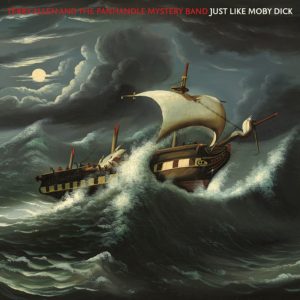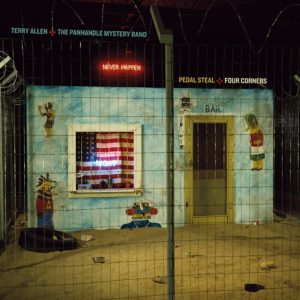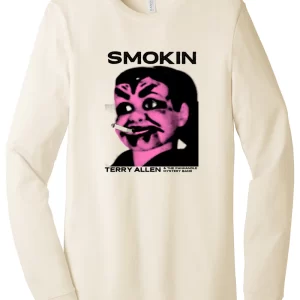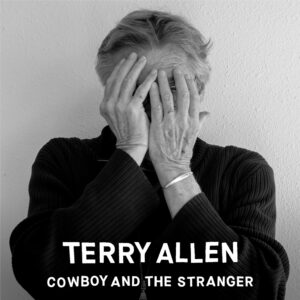Album Narrative
Things separate from their stories have no meaning. They are only shapes. Of a certain size and color. A certain weight. When their meaning has become lost to us they no longer have even a name. The story on the other hand can never be lost from its place in the world for it is that place. And that is what was to be found here. The corrido. The tale. And like all corridos it ultimately told one story only, for there is only one to tell.
— Cormac McCarthy, The Crossing
*
Juarez is not just an album, at least not in any ordinary sense of the word. Songwriter and visual artist Terry Allen describes it instead as a “haunting.” For nearly five decades, Juarez has served as the elusive, enigmatic axis mundi of his artistic and musical practices. Never discrete or static, the Juarez mythos continually accretes a growing constellation of new meanings, mutations, and manifestations, defying linearity and finality, appearing as drawings, constructions, songs, prints, installations, texts, a screenplay, a musical theater piece (co-written with David Byrne), a one-woman stage play, and an NPR radio play (both starring his wife, the actor and writer Jo Harvey Allen).
Herein Juarez inhabits the ur-corrido sonic artifact, a cycle of fifteen songs and recited poems—austere, atmospheric, cinematic—as recorded over the course of a few mornings at San Francisco’s venerable Wally Heider Studio in 1974. Its stately, minimal arrangements—Allen on piano and vocals, with guitarists Peter Kaukonen (Link Wray, Jefferson Airplane, Black Kangaroo) and Greg Douglas (Van Morrison, Peter Rowan, Steve Miller Band)—belie its sinister, mongrel strangeness, its anxious hilarity, its casual alloy of spirituality and profanity, its uncanny enormity as story. Originally released in 1975 by print workshop Landfall Press in an edition of fifty, with a set of nine lithographs (reproduced in full for the first time in the reissue’s extensive book), the record encompasses both conceptual corrido and cosmic cartography, song and séance, at once hermetic and wide-open. In these fifty-two minutes, geographies, climates, and spectral bodies collide and elide, dragged and fate-flung across the parched Southwest, over mesas and arroyos and through the abraded lens of colonial history, throwing dust, shedding blood, and further blurring the already arbitrary, and forever contested, boundaries of the U.S.-Mexico borderlands.
As described in one of the periodic narrative “dialogue” interludes spoken by Allen, Juarez recounts a deceptively “simple story”: a bleak journey, told in nonlinear terms, from Southern California through Colorado and into the Texas-Mexico borderlands. Like many cross-country road trips, it’s as harrowing as it is humorous, often within the margins of a single song or even an isolated line. The action revolves around two couples and their fateful—or arbitrary—murderous meeting in Cortez, Colorado. Sailor, on leave from the Navy, meets Spanish Alice, a prostitute, in a Tijuana bar; they get married and honeymoon in a mountain trailer park in Cortez. Meanwhile, on a crime spree detour, pachuco antihero Jabo and the witchy “rock-writer” Chic Blundie drive North from L.A. to Cortez on their way South to Jabo’s hometown of Ciudad Juarez (until recently the homicide capital of the world). Only one couple emerges from the bloody trailer, escaping across the New Mexican desert to Juarez, where they part, assuming (or absorbing?) new identities.
Terry Allen is no stranger to the ramifications of border-crossing—it’s something he’s been doing both literally and figuratively, geographically and professionally, for his entire adult life. A native West Texan who now lives in Santa Fe, New Mexico—he hails from Lubbock, also home to Buddy Holly, Waylon Jennings, and the Flatlanders—Allen occupies a unique position straddling the disparate worlds of country music and visual art. We’re not sure that you could say the same about anyone else, ever, and certainly not with the same level of aplomb, acclaim, and success—not to mention the same biting, self-effacing sense of humor about it all.
Allen’s artwork resides in the collections of the Met, MoMA, the Hirshhorn, and Los Angeles’ MoCA and LACMA, among many other institutions, and has been exhibited internationally at Documenta and the São Paolo, Paris, Sydney, and Whitney Biennales. You can encounter his public commissions across the U.S. He is the recipient of Guggenheim and NEA Fellowships. In the realm of music, in addition to several projects with the aforementioned Byrne, Allen has likewise collaborated closely with Guy Clark, Lloyd Maines (pedal steel master, producer, and father of the Dixie Chicks’ Natalie), and the Flatlanders (Butch Hancock, Joe Ely, and Jimmie Dale Gilmore). His songs have been covered, recorded, and championed by the likes of Dave Alvin, Laurie Anderson, Bobby Bare, Ryan Bingham, Don Everly, Jason Isbell, Robert Earl Keen, Little Feat, Ricky Nelson, Peter Rowan, Doug Sahm, Sturgill Simpson, and Lucinda Williams.
Forty years later, Juarez is widely regarded as Allen’s first masterpiece, timelessly relevant, resonating with works of film and literature as much as other music, recalling the existential violence of Terrence Malick’s Badlands (1973) and informing successors like David Lynch’s Wild at Heart (1990), Cormac McCarthy’s Border Trilogy (1992-98), and Roberto Bolaño’s 2666 (2004).
Paradise of Bachelors will reissue Terry Allen’s critically acclaimed 1979 double album Lubbock (on everything), the follow-up to Juarez, later in 2016.
Acknowledgments
The path that Allen chose was even wilier [than his country music contemporaries]: smuggling his outsider storytelling into the art world, leaning on his gnawing Texas twang to ground his imaginings in an uncivilized landscape. With Juarez, Allen conjures a still-Wild West, at once romantic and grotesque, nourishing and mystical…. It’s a dialogue between the freedom to move, to flee, to choose one’s destination, and the power to dominate — or the powerlessness of being dominated. The juxtaposition of such notions makes human agency feel vital, tenuous and jealously guarded indeed. The fact that Allen isn’t the least bit hung up on being linear or realistic in his telling of these tales make them all the more riveting.
– Jewly Hight, NPR Music’s Songs We Love
A singular moment in the history of country music [and] one of the most singular and underrated works in the history of US conceptual art. Lubbock (on everything) and Juarez are restless travelogues, songs of feeling out of place and in search of home.
– Dan Fox, Frieze
Mr. Allen’s magic strength is that he can keep two or more big ideas in the air at once, juxtaposing them without explicitly merging them until they kind of belong together: sex and real estate, love and colonization, greed or guilt… He’s pretty close to a master lyricist.
– The New York Times
Allen’s songs extract strangeness from the known world and use it as a means of acquiring greater knowledge. This is an old man’s confirmation of a young man’s speculation, which is as good definition of wisdom as any. [Juarez is] a series of beguilingly off-kilter songs about Texas, California, and Mexico, held together by spoken interludes that gave it the feel of a movie.
– The New Yorker
Grim, funny, epic and intimate all at once, Juarez belongs in a genre unto itself … timeless. His catalog, reaching back to 1975’s Juarez, has been uniformly eccentric and uncompromising, savage and beautiful, literate and guttural.
– Rolling Stone
9/10. A lovingly remastered version of the nebulous country classic. This riveting artifact, now with Allen’s original artwork and extensive booklet, only improves with age. A thing of intense beauty…
– Rob Hughes, Uncut
Juarez is a remarkable album in every sense… a beautiful package.
– Garth Cartwright, The Guardian
Terry Allen’s Juarez is a cornerstone work of Americana. Drawing on elements of Tex-Mex and norteno music, and delivered by Allen with a wild, lonesome spirit, it’s like an American offshoot of the Mexican narco-corrido tradition. It’s a fascinating oddity streaked with sex, violence and sorrow, a sort of seedcorn of the Robert Rodriguez aesthetic, presented complete with the lithographs that accompanied the original.
– Andy Gill, The Independent
8.0. Juarez retains its kick 40 years on. What stands out in revisiting it now is the stunning poetry of the lines themselves … [which] quiver with a raw vision rarely heard in folk or country. While Juarez has been reissued a few times over the decades, only with Paradise of Bachelors’ deluxe new reissue are Allen’s peculiar visuals again wedded with the music.
– Andy Beta, Pitchfork
One of the great conceptual masterpieces of Americana and the source text of almost everything the outlaw country star and master surrealist has done since.
– The Wire
Nobody else does country music like Terry Allen… There’s not a wasted word or extraneous musical lick.
– Los Angeles Times
He’s one of the last wild geniuses left who hasn’t been commercialized by the media. For 50 years, he’s sung neo-honky-tonk art songs in a thick-tongued Lubbockian drawl that makes Waylon Jennings sound as patrician as William F. Buckley Jr.
– Observer.com
A masterpiece, one of the great songwriter records. It stands equal with classics like Dylan’s Blood on the Tracks and Newman’s Good Old Boys, and it stands equal (or above) any made in the decades since.
– Dave Alvin
The single greatest concept album of all time… Juarez is an experience, one that can break your heart with the sweetness of “What of Alicia” or “Dogwood” or put the sting of whiskey in the back of your throat with the hard, crass thumping of “Border Palace” or “There Outta Be a Law Against Sunny Southern California”. This little-known Terry Allen album deserves a larger audience, a new and much bigger set of listeners to puzzle over this eccentric classic.
– PopMatters
Grounding high art. Every sound and insinuation on this 1975 recording is the farthest point from passive and will stay with you like a tattoo. The music and performances (bad-ass piano playing, slide guitar, and a voice that you’d better take seriously or else) on this work are only to be experienced and not explained.
– Richard Buckner
One of the more fascinating country albums of its time, like Willie Nelson’s Red Headed Stranger as reimagined by Tarantino. There may be no greater maverick than Terry Allen in all of country music from the mid-’70s onward.
– AllMusic
A true modern day Renaissance man… renowned for his effortless command and outrageous combination of disparate genres and media, according to the task at hand.
– Dave Hickey
There is just one person whose art has been seen in highbrow museums around the country and is an inductee of the Buddy Holly Walk of Fame in Lubbock, Tex. He is Terry Allen, [and] he favors a style you might call Old West Psychedelic.
– Ken Johnson, New York Times
Seminal 70s recordings Juarez and Lubbock (On Everything) are resolute, meant to be absorbed in their entirety. With humor and a gift for songwriting, each finds Allen subtly giving the middle finger to any and all expectations of what Country is or should be… Very few concept albums drum up and maintain the sincerity and reverence that Juarez encapsulates.
– Aquarium Drunkard
Not quite country and not quite rock, the music of Juarez is as unique as the man himself. Allen’s voice is incredible; he shifts from mellow Texas drawl—a more nasal Randy Newman—to bloodcurdling intensity from line to line. Against the darkness of the material, Allen’s singing and songcraft manage to convey humor and warmth, elevating the story and music out of the realm of pulp.
– Clinton Krute, BOMB Magazine
4 stars. This is barrio poetry writ widescreen … an atmosphere where Randy Newman’s Good Old Boys meets Dylan’s Desire, with Cormac McCarthy buying shots. Repeated listens will quickly have Juarez clawing at the brain and the heart. Here finally is a soundtrack for an imaginary film where your imagination is allowed to run wild in the borders between myth and reality.
– Mike Goldsmith, Record Collector Magazine
A vortex of sex and violence.
– David Byrne
The songs are vivid, desperate, poetic, and brutal, like the anti-Randy Newman.
– MOJO
From football heroes gone wrong to noble floozies to farmers fiddling while Washington burns, he’s a tale-spinning poet of the Panhandle.
– Robert Christgau
Little official country music is this good. The music cranks and lopes along, stops and starts again; there are a lot of holes in it, a high-plains silence that always waits behind the music, as if to tempt Allen into shutting up again.
– Artforum
Throw Lynch’s violent masterworks Blue Velvet and Wild at Heart in a blender with Burroughs’s Naked Lunch and Bowles’s The Sheltering Sky, and you’re getting warm.
– Houston Press
A. His music defies easy categorization, as it uses his home state of Texas and the American West as a canvas to explore the drama and humor of existence. Juarez endures as one of the great concept albums and underlines Allen’s value as a true original.
– Joseph, Neff The Vinyl District
Juarez continues to sounds fresh and contemporary today. His ability to spin a memorable yarn that continues to echo in the mind long after it’s gone can leave one mute with admiration. Terry Allen is a fucking genius.
– The Big Takeover
I love Terry. He’s a funny son of a bitch.
– Guy Clark
People tell me it’s country music, and I ask, “which country?”
– Terry Allen





































